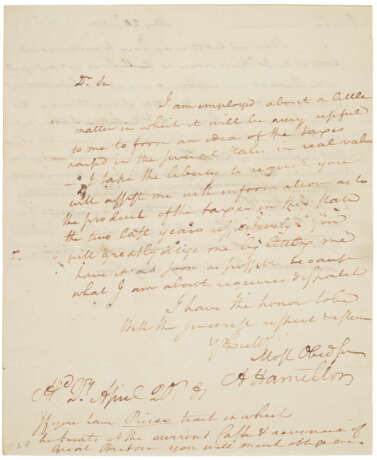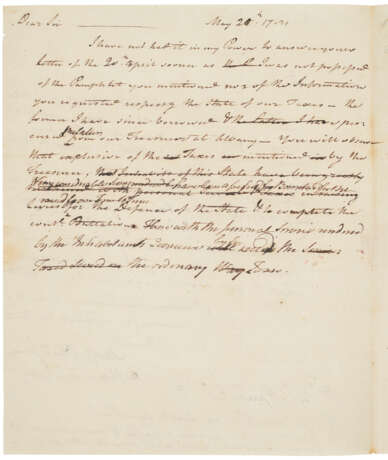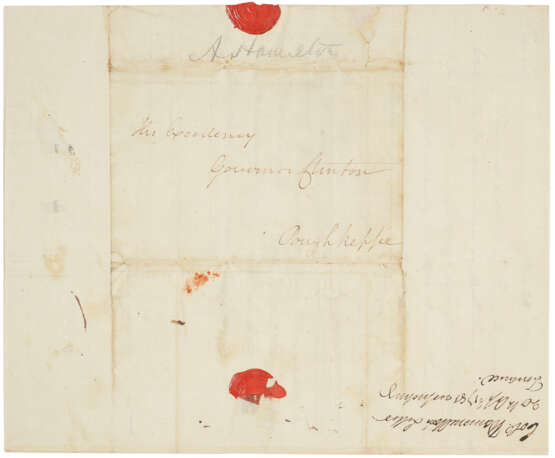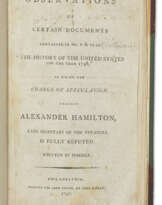ID 1362242
Lot 645 | Preparing for his first published work on finance
Estimate value
$ 20 000 – 30 000
Alexander Hamilton, 20 April 1781
HAMILTON, Alexander (1757-1804). Autograph letter signed ("A Hamilton,") to George Clinton, "Hd Qrs," [New Windsor,] 20 April 1781.
One page, bifolium, 232 x 191mm. Addressed in his hand on the integral transmittal leaf (tear repaired, a few spots of dustsoiling). [With:] CLINTON, George. Partial autograph letter to Alexander Hamilton, [Poughkeepsie], 20 May 1781 accomplished on the interior leaf.
Alexander Hamilton seeks information on state taxation and finance from New York Governor George Clinton in an unpublished letter composed in preparation for his first published essays on American finance and governance—the contents previously unknown to the Papers of Alexander Hamilton. After four years on Washington's staff as aide-de-camp, Hamilton resigned his post following a brief but consequential dispute with the Commander-in-Chief in February 1781. While lobbying for a coveted field command, Hamilton was also pondering the looming financial crisis that threatened to derail the struggle for independence. In the spring, Hamilton began work on a lengthy treatise on the sorry state of American finance and governance that would be published first in The New-York Packet in the summer of 1781 under the title of "The Continentalist." Appearing in four parts, the work advocated for a stronger central government that could better manage the nation's finances that Chernow described as "spirited precursors to The Federalist Papers.". It was likely for the purpose of this essay that he wrote the present letter to Governor Clinton:
"I am employed about a little matter in which it will be very useful to me to form an idea of the taxes raised in the several states in real value — I take the liberty to request you will assist me with information as to the product of the taxes in this state the two last years respectively. You will greatly oblige me by letting me have it as soon as possible to camp what I am about requires dispatch[.]" In a short postscript below his signature, he askes if "If you have Price[']s tract in which he treats of the current Cash & revenue of Great Britain you will much oblige me."
Not receiving any reply from Clinton for nearly a month, Hamilton wrote him again on 22 May reminding of his inquiry, and asking if he "had leisure to think of this matter, and to procure the estimate, I shall thank you very much for it, unless there may be any impropriety in the communication. I have a particular and important object in view from it (Hamilton to Morris, 30 April 1781). Unbeknownst to Hamilton, two days prior to Hamilton's reminder, Clinton attempted a response, which he drafted on the interior leaf of the present letter writing [corrections and deletions omitted]: "I have not had it in my Power to answer your letter of the 20th April sooner as I was not possessed of the Pamphlet you mentioned nor of the Information you requested respec[ti]ng the state of our Taxes — the former I have since borrowed & the latter I have upon our [illeg.] from our Treasurer at Albany — You will observe that inclusive[?] of the Taxes mentioned by the Treasurer, very considerable sums have been assessed … for the Levies from time to time for the Defence of the State & to complete the cont[inenta]l Battalions. Those with the personal service rendered and by the Inhabitants I conceive by far exceeding the ordinary Taxes."
Chernow hailed Hamilton's essays a "virtuoso performance." in which he "asserted the need for financial reforms to complete the Revolution, 'Tis by introducing order into our finances--by restoring public credit—not by gaining battles that we are finally to gain our object.'" "Clearly," Chernow concluded, "Hamilton was in training to superintend American finances someday." (157)
Yet even before Hamilton published his remarks that summer, he had earned a reputation for a keen understanding of finance and political economy. When Congress established the post of Superintendent of Finance in early 1781, John Sullivan had plans to put Hamilton's name forward for the position, going as far as to sound out Washington on the matter. Surprisingly, Washington could not comment on Hamilton's financial acumen, admitting that he had "never entered upon a discussion of this point with him—but," he added, "this I can venture to advance from a thorough knowledge of him, that there are few Men to be found, of his age, who has a more general knowledge than he possesses—and none whose Soul is more firmly engaged in the cause—or who exceeds him in probity & Sterling virtue." (GW to JS, 4 February 1781, Papers). Ultimately, with support in Congress coalescing around Robert Morris, who had already leveraged his personal connections and his personal credit to keep American finances afloat, Sullivan decided to withhold Hamilton's name from nomination. Provenance: A. T. White or Adrien Van Sinderen – by descent to the consignor.
| Artist: | Alexander Hamilton (1755 - 1804) |
|---|---|
| Category: | Services |
| Auction house category: | Letters, documents and manuscripts, Books and manuscripts |
| Artist: | Alexander Hamilton (1755 - 1804) |
|---|---|
| Category: | Services |
| Auction house category: | Letters, documents and manuscripts, Books and manuscripts |
| Address of auction |
CHRISTIE'S 20 Rockefeller Plaza 10020 New York USA | ||||||||||||||
|---|---|---|---|---|---|---|---|---|---|---|---|---|---|---|---|
| Preview |
| ||||||||||||||
| Phone | +1 212 636 2000 | ||||||||||||||
| Fax | +1 212 636 4930 | ||||||||||||||
| Conditions of purchase | Conditions of purchase | ||||||||||||||
| Shipping |
Postal service Courier service pickup by yourself | ||||||||||||||
| Payment methods |
Wire Transfer | ||||||||||||||
| Business hours | Business hours
|













